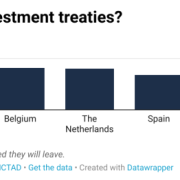15-Nov-2022
https://sites.google.com/view/isds-...
Civil society organisations are calling on governments to remove the threat that ISDS poses to the climate. The following statement outlines our primary concerns and demands. We seek to put pressure on our governments as they meet at COP 27 in November 2022.
15-Nov-2022
The Australian Financial Review
In a big win for unions and “fair trade” campaigners, Australian Trade Minister will announce government’s vow to strip future free trade agreements of investor-state dispute settlement clauses and water them down in existing deals.
14-Nov-2022
The Australian Financial Review
Massive compensation claims loom over the Australian government’s gas market intervention, with lawyers warning price caps and windfall profit taxes could lead to legal action under trade agreements.
4-Nov-2022
Energy Monitor
EU countries are voting with their feet, quitting the investor protection pact despite the EU’s efforts to reform it – but the European Commission warns it will be worse to be outside than in.
3-Nov-2022
The Real News Network
US senators argue that abolishing special economic zones known as ZEDEs would violate the provisions of CAFTA-DR, including the provision ensuring “fair and equitable treatment and full protection and security.”
26-Oct-2022
African Climate News
African countries are increasingly becoming signatories to the ECT potentially tying the hands of government to freely design their climate policies.
26-Oct-2022
Climate Change News
France, Germany and Spain plan to leave the controversial investment pact, putting a whole system of dirty energy protections into play.
26-Oct-2022
Balkan Green Energy News
A tribunal operating under the World Bank has ruled in favor of ten companies that initiated arbitration with the argument that Romania violated the Energy Charter Treaty by lowering incentives for their solar power plants.
21-Oct-2022
Extractive360
Signing the ECT would give the transnational companies in the energy sector a weapon to re-colonise Nigeria, as it would also be incompatible with Nigeria’s economic diversification aspirations.







